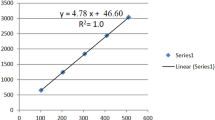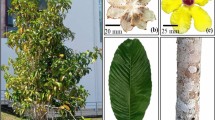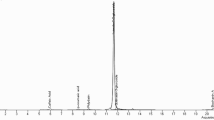Abstract
Essential oil of eucalyptus species is among the most common traded essential oils in the world. There is an increasing interest in the application of eucalyptus oil as a natural additive in food and pharmaceutical industry. The present study was undertaken to identify the phytoconstituents present in the essential oil of Eucalyptus globulus leaves (EO) and ascertain their protective effect against ketamine-induced psychosis in rats. GC–MS technique was used for analysis of phytoconstituents present in EO. Ketamine (50 mg/kg, i.p.) was used to induce psychosis in rats. Photoactometer, forced swim test and pole climb avoidance test were used to evaluate the protective effects of the EO (500, 1000 and 2000 mg/kg, p.o.) on acute and chronic administration. Bar test was used to test the side effect of EO. Biochemical and neurochemical estimations were carried out to explore the possible mechanism of action. GC–MS analysis of EO showed the presence of a number of biologically active compounds. EO at the dose of 500, 1000 and 2000 mg/kg, p.o. on acute and chronic administration, decreased locomotor activity, immobility duration and latency to climb the pole. EO was effective to facilitate the release of GABA, increase GSH levels, inhibit dopamine neurotransmission and decrease TNF-α levels as well as diminish AChE activity in different regions of the brain. EO at the dose of 500, 1000 mg/kg did not produce cataleptic behavior in rats. EO at the dose of 500, 1000 mg/kg produced protective effects against ketamine-induced psychosis and can be further explored clinically against neuropsychiatric disorders.





Similar content being viewed by others
Abbreviations
- GC–MS:
-
Gas chromatography–mass spectroscopy
- GABA:
-
Gamma-aminobutyric acid
- GSH:
-
Glutathione
- TNF-α:
-
Tumor necrosis factor-alpha
- AChE:
-
Acetylcholinesterase
- NMDA:
-
N-Methyl-d-aspartate
References
Aazza S, Lyoussi B, Miguel MG (2011) Antioxidant and antiacetylcholinesterase activities of some commercial essential oils and their major compounds. Molecules 16:7672–7690
Abdel-Salam OM, Youness ER, Mohammed NA, Omara EA, Sleem AA (2015) Effect of ketamine on oxidative stress following lipopolysaccharide administration. Comp Clin Path 24:53–63
Al-Asmari AK, Athar MT, Al-Faraidy AA, Almuhaiza MS (2017) Chemical composition of essential oil of Thymus vulgaris collected from Saudi Arabian market. Asian Pac J Trop Biomed 7:147–150
Andrade MA, das Graças Cardoso M, de Andrade J (2013) Chemical composition and antioxidant activity of essential oils from Cinnamodendron dinisii Schwacke and Siparuna guianensis Aublet. Antioxidants 2:384–397
Angioni A, Barra A, Coroneo V, Dessi S, Cabras P (2006) Chemical composition, seasonal variability, and antifungal activity of Lavandula stoechas L. ssp. stoichas essential oils from stem/leaves and flowers. J Agric Food Chem 54:4364–4370
Aydin E, Turkez H, Tasdemir S (2013) Anticancer and antioxidant properties of terpinolene in rat brain cells. Arh Hig Rada Toksikol 64:415–424
Benturquia N, Courtin C, Noble F, Marie-Claire C (2008) Involvement of D1 dopamine receptor in MDMA-induced locomotor activity and striatal gene expression in mice. Brain Res 1211:1–5
Chatterjee M, Ganguly S, Srivastava M, Palit G (2011) Effect of ‘chronic’ versus ‘acute’ ketamine administration and its ‘withdrawal’ effect on behavioral alterations in mice: implications for experimental psychosis. Behav Brain Res 216:247–254
Chatterjee M, Singh S, Kumari R, Verma AK, Palit G (2012) Evaluation of the antipsychotic potential of Panax quinquefolium in ketamine induced experimental psychosis model in mice. Neurochem Res 37:759–770
Ciftci O, Ozdemir I, Tanyildizi S, Yildiz S, Oguzturk H (2011) Antioxidative effects of curcumin, β-myrcene and 1, 8-cineole against 2, 3, 7, 8-tetrachlorodibenzo-p-dioxin-induced oxidative stress in rats liver. Toxicol Ind Health 27:447–453
da Silva FC, de Oliveira Cito MD, da Silva MI, Moura BA, de Aquino Neto MR, Feitosa ML, de Castro Chaves R, Macedo DS, de Vasconcelos SM, de França Fonteles MM, de Sousa FC (2010) Behavioral alterations and pro-oxidant effect of a single ketamine administration to mice. Brain Res Bull 83:9–15
Davis J, Moylan S, Harvey BH, Maes M, Berk M (2014) Neuroprogression in schizophrenia: pathways underpinning clinical staging and therapeutic corollaries. Aust N Z J Psychiatry 48:512–529
Dhingra MS, Dhingra S, Kumria R, Chadha R, Singh T, Kumar A, Karan M (2014) Effect of trimethylgallic acid esters against chronic stress-induced anxiety-like behavior and oxidative stress in mice. Pharmacol Rep 66(4):606–612
Dobetsberger C, Buchbauer G (2011) Actions of essential oils on the central nervous system: an updated review. Flavour Fragr J 26:300–316
Ellman GL (1959) Tissue sulphydryl groups. Arch Biochem Biophys 82:70–77
Ellman GL, Courtney KD, Andres V, Featherstone RM (1961) A newand rapid colorimetric determination of acetylcholinesteraseactivity. Biochem Pharmacol 7:88–95
Faludi G, Dome P, Lazary J (2011) Origins and perspectives of schizophrenia research. Neuropsychopharmacol Hung 13:185–192
Fell MJ, McKinzie DL, Monn JA, Svensson KA (2012) Group II metabotropic glutamate receptor agonists and positive allosteric modulators as novel treatments for schizophrenia. Neuropharmacology 62:1473–1483
Hons J, Zirko R, Ulrychova M, Cermakova E, Doubek P, Libiger J (2010) Glycine serum level in schizophrenia: relation to negativesymptoms. Psychiatry Res 176:103–108
Kandi P, Hayslett RL (2011) Nicotine and 17b-estradiol produce an antidepressant- like effect in female ovariectomized rats. Brain Res Bull 84:224–228
Kessler A, Sahin-Nadeem H, Lummis SC, Weigel I, Pischetsrieder M, Buettner A, Villmann C (2014) GABAA receptor modulation by terpenoids from Sideritis extracts. Mol Nutr Food Res 58:851–862
Kim YD, Lantz-McPeak SM, Ali SF, Kleinman MT, Choi YS, Kim H (2014) Effects of ultrafine diesel exhaust particles on oxidative stress generation and dopamine metabolism in PC-12 cells. Environ Toxicol Pharmacol 37:954–959
Kumar A, Yadav M, Parle M, Dhingra S, Dhull DK (2017) Potential drug targets and treatment of schizophrenia. Inflammopharmacol 25(3):277–292
Lowe IP, Robins E, Eyerman GS (1958) The fluorimetric measurement of glutamic decarboxylase and its distribution in brain. J Neurochem 3(1):8–18
Macedo EM, Santos WC, Sousa Neto BP, Lopes EM, Piauilino CA, Cunha FV, Sousa DP, Oliveira FA, Almeida FR (2016) Association of terpinolene and diclofenac presents antinociceptive and anti-inflammatory synergistic effects in a model of chronic inflammation. Braz J Med Biol Res 49:e5103
Masotti V, Juteau F, Bessière JM, Viano J (2003) Seasonal and phenological variations of the essential oil from the narrow endemic species Artemisia molinieri and its biological activities. J Agric Food Chem 51:7115–7121
Miyazawa M, Yamafuji C (2005) Inhibition of acetylcholinesterase activity by bicyclic monoterpenoids. J Agric Food Chem 53:1765–1768
Monji A, Kato T, Kanba S (2009) Cytokines and schizophrenia: microglia hypothesis of schizophrenia. Psychiatry Clin Neurosci 63:257–265
Sanberg PR, Bunsey MD, Giordano M, Norman AB (1988) The catalepsy test: its ups and downs. Behav Neurosci 102:748–759
Schlumpf M, Lichtensteiger W, Langemann H, Waser PG, Hefti F (1974) A fluorometric micromethod for the simultaneous determination of serotonin, noradrenaline and dopamine in milligram amounts of brain tissue. Biochem Pharmacol 23:2437–2446
Shah R, Subhan F, Ali G, Ullah I, Ullah S, Shahid M, Ahmad N, Fawad K (2016) Olanzapine induced biochemical and histopathological changes after its chronic administration in rats. Saudi Pharm J 24:698–704
Sharma K, Parle M, Yadav M (2016) Evaluation of antipsychotic effect of methanolic extract of Ocimum sanctum leaves on laboratory animals. J App Pharm Sci 6:171–177
Silva Brum LF, Elisabetsky E (2001) Effects of linalool on [3H] MK801 and [3H] muscimol binding in mouse cortical membranes. Psychiatry Res 15:422–425
Slattery DA, Cryan JF (2012) Using the rat forced swim test to assess antidepressant-like activity in rodents. Nat Protoc 7:1009–1014
Soni K, Parle M (2017) Trachyspermum ammi seeds supplementation helps reverse scopolamine, alprazolam and electroshock induced amnesia. Neurochem Res 42:1333–1344
Tandon R, Gaebel W, Barch DM, Bustillo J, Gur RE, Heckers S, Malaspina D, Owen MJ, Schultz S, Tsuang M, Van Os J (2013) Definition and description of schizophrenia in the DSM-5. Schizophr Res 150:3–10
Wagner C, Sefkow M, Kopka J (2003) Construction and application of a mass spectral and retention time index database generated from plant GC/EI-TOF-MS metabolite profiles. Phytochemistry 62:887–900
Yadav M, Parle M (2017) Eucalyptus oil decreases stereotypic behaviours induced by NMDA receptor antagonist ketamine. Int J Herb Med 5:27–30
Yadav M, Jindal DK, Dhingra MS, Kumar A, Parle M, Dhingra S (2017a) Protective effect of gallic acid in experimental model of ketamine-induced psychosis: possible behaviour, biochemical, neurochemical and cellular alterations. Inflammopharmacol. https://doi.org/10.1007/s10787-017-0366-8
Yadav M, Parle M, Sharma N, Dhingra S, Raina N, Jindal DK (2017b) Brain targeted oral delivery of doxycycline hydrochloride encapsulated Tween 80 coated chitosan nanoparticles against ketamine induced psychosis: behavioral, biochemical, neurochemical and histological alterations in mice. Drug Deliv 24:1429–1440
Yadav M, Parle M, Jindal DK, Dhingra S (2018) Protective effects of stigmasterol against ketamine-induced psychotic symptoms: possible behavioral, biochemical and histopathological changes in mice. Pharmacol Rep. https://doi.org/10.1016/j.pharep.2018.01.001
Zhao CX, Liang YZ, Fang HZ, Li XN (2005) Temperature-programmed retention indices for gas chromatography–mass spectroscopy analysis of plant essential oils. J Chromatogr A 1096:76–85
Acknowledgements
The authors are grateful to Guru Jambheshwar University of Science and Technology, Hisar, Haryana (India) for financial assistance.
Author information
Authors and Affiliations
Corresponding author
Rights and permissions
About this article
Cite this article
Yadav, M., Jindal, D.K., Parle, M. et al. Targeting oxidative stress, acetylcholinesterase, proinflammatory cytokine, dopamine and GABA by eucalyptus oil (Eucalyptus globulus) to alleviate ketamine-induced psychosis in rats. Inflammopharmacol 27, 301–311 (2019). https://doi.org/10.1007/s10787-018-0455-3
Received:
Accepted:
Published:
Issue Date:
DOI: https://doi.org/10.1007/s10787-018-0455-3




